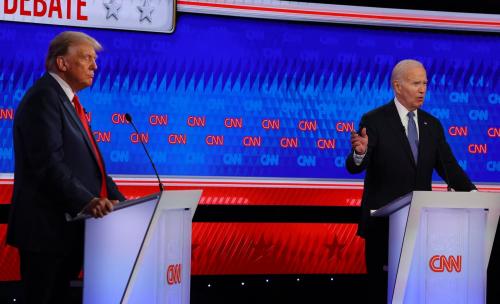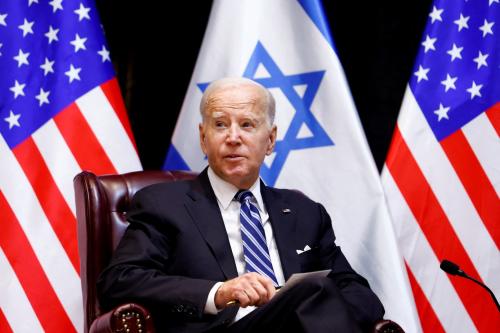The most important thing that Hillary Clinton had to accomplish in her speech in San Diego on Thursday was to prove that presumptive Republican nominee Donald Trump was uniquely dangerous in his worldview. Before Thursday this was not particularly straightforward. For several months, Trump’s advisers and supporters—including leading figures like Bob Corker of the Senate Foreign Relations Committee—have been arguing that Trump is an internationalist but wants allies to do a little bit more; that he wants a better deal on trade; and is skeptical of humanitarian intervention.
They frame his worldview in this way because they know there is a significant market in the electorate for a foreign policy of modest retrenchment. Many Americans are disillusioned after 15 years of war and a financial crisis. They want the United States to do less in the world. If Trump’s team could turn the election into a choice between increased engagement and a prudent form of nationalism, they may be able to unite Republicans and scoop up some Democrats and Independents.
What voters want
The problem that Trump’s advisers and supporters have is Trump himself. Trump does not just want a modest retrenchment or renegotiation of America’s commitments. He wants to take a wrecking ball to U.S. foreign policy. He believes that the United States should not be militarily present in Asia, he wants to end NATO’s traditional mission of balancing Russia, he wants to start a trade war with China, and he wants to start a cold war with Mexico. He has promised to force America’s allies to pay trillions of dollars extra to pay for the entire cost of the US presence in Asia or he would pull out. Trump has held this isolationist America First worldview since the mid-1980s. When Trump speaks off the cuff, these views come pouring out. This is why he gave a scripted foreign policy speech at the Center for the National Interest. It was part of a systematic effort to reframe his worldview so it would have greater appeal. It was always going to be hard to sustain. But his team tried. And for good reason.
Trump does not just want a modest retrenchment or renegotiation of America’s commitments. He wants to take a wrecking ball to U.S. foreign policy.
While a significant number of Americans may be receptive to a foreign policy of prudent restraint, it is very unlikely that they want to run the experiment of deliberately and proactively destroying what Dean Acheson called America’s “situations of strength” around the world. There is no evidence that they want to dismantle NATO or the U.S.-Japan alliance. They may be skeptical of trade but there is no appetite for a trade war with some of the world’s largest economies. They may be frustrated that America’s allies don’t spend more on defense, but they don’t want Japan, South Korea, and Saudi Arabia to acquire nuclear weapons. They don’t want a demolition man.
A pill he can’t swallow
So Clinton had to drive a wedge between Trump and his advisers. She had to close off the path where Trump could disguise himself in the protective garb of prudent nationalism. She framed the choice as between America as a superpower leading an international order and America as a rogue state. She detailed why alliances have a practical benefit for the United States. She connected Trump’s worldview with his temperament and explained why it would destabilize the world and weaken America. And she did this by using Trump’s own words over the last three decades.
The only way that Trump could effectively rebut the speech would be to disavow dozens of his own prior statements and demonstrate he is a responsible steward of American foreign policy—that he understands why alliances matter, why the United States defines its national interests broadly, and why the U.S. economy does best when the rest of the world does well. But this is the one thing that Trump cannot do. Trump’s view of the world is perhaps more deeply held than any other belief he has. Much as he is on every side of multiple issues, he has been remarkably consistent in his core foreign policy beliefs. He is convinced that the rest of the world is ruining America and that the United States can only be successful if it exploits and beats other nations and sheds itself of its international commitments. So he will double down. And as he does, he will reinforce every word of Clinton’s San Diego speech and further alienate those voters who may be skeptical of an activist foreign policy but do not want to run the experiment of deliberately burning the international order to the ground.



Commentary
What Hillary Clinton’s San Diego speech accomplished
June 3, 2016